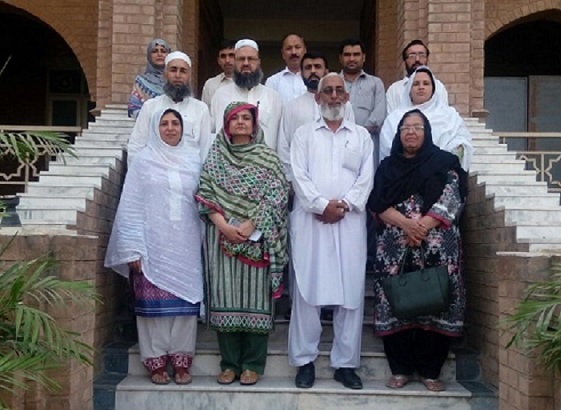Public Defense of a Ph.D Research Scholar at Department of Geography
Ms. Sadia Shah , a Ph.D. Research Scholar at the Department of Geography, University of Peshawar has submitted her thesis entitled "Spatial assessment of Gender Related Policies on the incidence of Depression amongst Women aged (18-49) A crass sectional study in Peshawar
All those having interest in the said research work, are cordially invited to attend the occasion. The participants would be allowed to raise relevant questions after the presentation by the scholar for further judgment and evaluation of the examiners.
ABSTRACT
The purpose of this study was the spatial assessment of gender related policies on the incidence of depression amongst women aged (18-49): a cross sectional study in Peshawar. The main objective of the study was to determine the awareness level of women aged 18-49 about depression and gender related policies and programs to explore the effectiveness of the policies and programs introduced by the government for the reduction of depression.
Spatial distribution of health related phenomena amongst adult women is one of the focus areas of medical, social and gender geography. The major causes of high prevalence rate of depression among women are due to the various role and responsibilities which women accomplish in the society. Thus subject them to a greater consequences of facing mental and health problems.
Women in Pakistan generally have higher rates of depression than men.As depression is the root cause of many mental disorders and illness, therefore is a need to grow and collect evidence for evidence based to policy and development on tackling anxiety and depressive disorders in study area in particular and at national level in general. Women who are unaware of their rights cannot demand them. Governments and organizations without access to specific standards guidelines cannot effectively target these problems. Once evidence gathered and awareness developed, the potential for solving the issue will be increased. The study also draws attention to the visions that the research provides into the difficulties of policy, variations in application of gender related policies.It is important to examine the assumptions under which policies, programs are planned to improve the status of women.
The intervention designed and adopted for the reduction of depression amongst the target group through the community focus group discussion and participation of communitynotables after conducting survey in the individual women age 18-48 and analysis. Focus group discussion was conducted as part of this research where both qualitative and quantitative research techniques were applied. The research started with intervention group consisting of 370 women respondents spread all over in the study area where survey was carried out in 2007. After preliminary analysis the information regarding various themes related to depression were extracted from the data collected from intervention group in 2007. The findings were then shared with them through focus group discussion. The participant of focus group discussion were community notables like public representatives, teachers, government officials, members of civil society, media, academia, councilors, pesh imams and others who were ready to cooperate to make people aware regarding problems of depression and related policies and programmes launched by the government for bringing improvement. The intervention theme consists of two very important components viz awareness about depression and legislation about the gender law. The other group located in the study area called control group where no intervention was made.The odd ratio result reveals that intervention group having knowledge more information as compared to control group where no intervention has been made.
The findings highlight the complex and dynamic role of family, community and culture in helping the development of women. Lack of education, especially girl’s education is the major problem. Until and unless it is not taken seriously it will be difficult to achieve the goal regarding the reduction of depression. Lack of awareness further intensified problem which make situation more difficult and women suffered a lot psychologically and become victim of depression.This study empirically proved the role of awareness besides the low Socio economic status (SES) is the key determinants of depression among women, such as poverty, violence, environmental degradation/pollution and cultural barrier which further make problem significant. Through intervention the situation may be improved. Increased awareness brings change in attitudes or approaches

